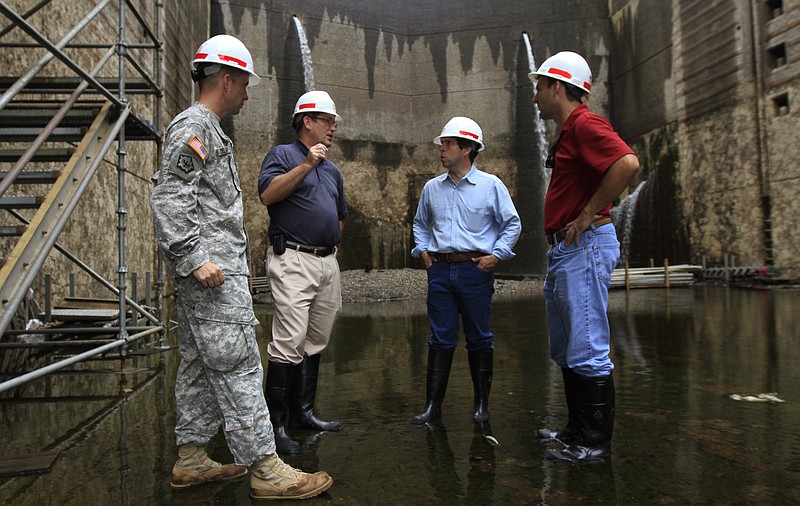In an era of rising building costs, stagnant tax collections and no Congressional earmarks, finding enough money to restart construction of a new Chickamauga Lock has been a prolonged battle for U.S. Rep. Chuck Fleischmann.
Fleischmann, the Chattanooga Republican who campaigned more than four years ago on a pledge to fix Washington and the crumbling lock in Chattanooga, has yet to see the stalled project resume. But Fleischmann said Thursday he is convinced work will be restarted next year if the Army Corps of Engineers abides with the funding and direction from a critical House spending plan approved this week.
"This has been probably the most difficult, but also the most rewarding project, that I have worked on in my tenure in Congress," the third-term congressman said Thursday. "When I ran for Congress, I said I wanted to help fix things that were broken and little did I know how broken things were in Congress."
The existing Chickamauga Lock, built in the 1930s, is too small for multi-barge shipments and suffers from "concrete growth" in its rock aggregate that could force the permanent closing of the river chamber within the next decade.
Design work began on a new and bigger lock at the Chickamauga Dam more than a decade ago by the U.S. Army Corps of Engineers, the federal agency that took over operation of the lock from the Tennessee Valley Authority in the 1980s.
But the funding source for the lock, the Inland Waterways Trust Fund, ran short of funds to sustain the project when rebuilding and expanding the Olmsted lock and dam on the Ohio River turned into a $3 billion project and absorbed most of the available funds. Congress, until last year, also was reluctant to raise fuel taxes to help replenish the trust fund or to appropriate more taxpayer dollars to complete many of the projects it authorized.
The Corps has spent more than $180 million on the Chickamauga Lock, including $52 million from the federal stimulus plan adopted in 2009 but criticized by Fleischmann and many Republicans. Since then, the Chickamauga Lock project has been stalled and the Corps now estimates the cost of building the new Chickamauga Lock has grown to $860 million, nearly triple the original estimate when the project was authorized by Congress in 2003.
To revive the project, Fleischmann and others in the House -- and U.S. Sen. Lamar Alexander and others in the Senate -- have worked to revamp the funding formula for locks and dams, ensure that the priority schedule is maintained for the Chickamauga Lock, raise the fuel tax by 9 cents per gallon on barges to generate more money, and now appropriate more money for the Corps.
The changes have combined to provide up to $340 million in fiscal 2014 for locks and dams by the Corps. The Waterways Council Inc., the trade group that represents the barge industry, projects that should be adequate to resurrect stalled projects at both the Chickamauga and Kentucky locks on the Tennessee River.
Michael Toohey, president of the Waterway Council Inc., said the unanimous vote this week by the House Appropriations Committee to boost the Corps' budget "is a huge win toward modernization of our nation's inland navigation system," and should ensure that work resumes on the next phase of the new Chickamauga Lock in fiscal 2016.
The Corps may opt to restart work even earlier if its agrees this summer to use $6 million in surplus funds anticipated in the current fiscal year due to tax increases and other changes to start work in Chattanooga.
"I'm pushing the Corps for that to happen," Fleischmann said.
The Corps estimates it will take about five years to complete construction of the new lock once the project is revived.
Contact Dave Flessner at dflessner@timesfreepress.com or at 423-757-6340.
